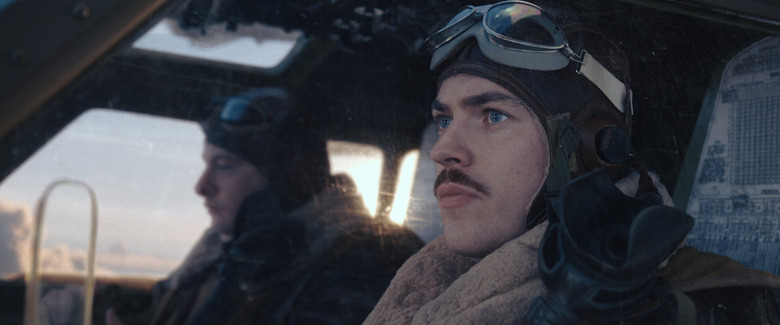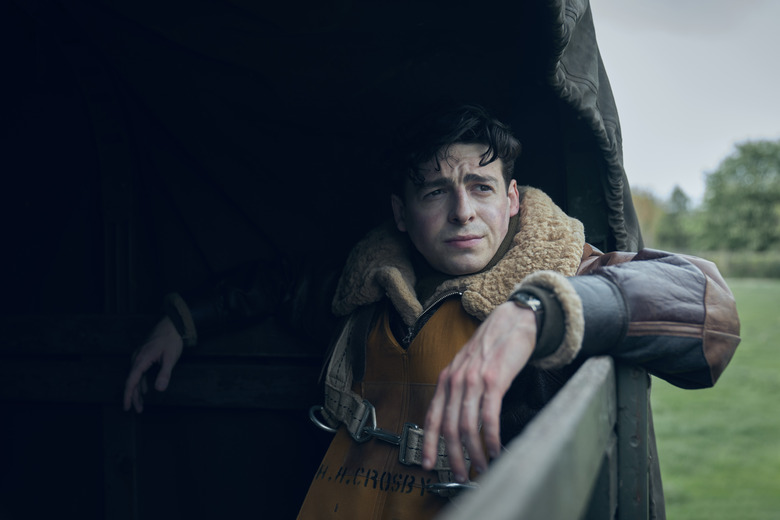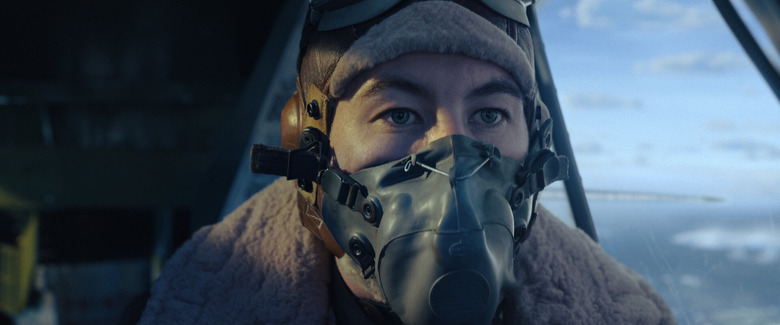Watch The First 5 Minutes Of Apple TV+'s Epic New Series Masters Of The Air Right Here
We may receive a commission on purchases made from links.
Apple's new World War II series Masters of the Air opens with a close-up of two shot glasses slammed down on a bar counter with well-practiced authority by airmen in crisp uniforms. As the camera slowly pulls back, the men chat about their imminent posting "over there" and watch a couple dance to a crackly big band record. Another airman flashes a smile at a pretty blonde standing across the bar. She smiles back, flirtatiously. The focus of the scene then shifts to an Air Force squadron commander seated at a table, who lets out a sigh and then grins while asking his comrade: "So, this is it?"
"This is it."
"See you in a few weeks."
The "few weeks" for those bomber boys amount to mere seconds for us, as the next thing we see in the opening moments of this nine-episode Apple TV+ drama is a Flying Fortress with the 389th Bomb Group, somewhere high in the sky over Wilhelmshaven, Germany. It's May 1943, two years before the war's end. Part of the bomber is aflame, and its nose is angled ominously toward the ground. As the bomber descends through the clouds, one of the crew members screams for help.
'A simmering and winking constellation of aerial grace'
Apple's new series — based on Donald L. Miller's 2006 book of the same name, and the producers of which include Tom Hanks and Steven Spielberg — is a frequently breathtaking ode to brotherhood and patriotism, punctuated by the horrors of the air war over Nazi Germany. It also represents the third installment of what's now a completed WWII trilogy from Hanks and Spielberg, following 2001's Band of Brothers and 2010's The Pacific.
All three productions downscale the bigness of the multi-theatre global conflict by exposing the viewer to the triumphs and tragedies of an individual military unit. In the case of Masters of the Air, the first five minutes of which you can watch below, its sprawling narrative is built around the 100th Bomb Group that flew awe-inspiring B-17s. "No one ... could fail to thrill at the sight of the great phalanxes streaming away from their East Anglian airfields," wrote historian John Keegan, who grew up in England during the war, as recounted in Miller's book.
"Squadron after squadron, they rose to circle into groups and wings and then set off south-eastward for the sea passage to their targets, a shimmering and winking constellation of aerial grace and military power, trailing a cirrus of pure white condensation from 600 wing tips against the deep blue of English summer skies."
Another triumph for Apple TV+
That poetic description of the fight to control the skies is magnificently brought to life in Masters of the Air, which follows the airmen of the "Bloody Hundredth" from their training days to deployment to the eventual bombing raids over Germany.
Episodic vignettes about the individual airmen — including Maj. Gale "Buck" Cleven, played by Elvis' Austin Butler — make the unit's high casualty rate all the more emotionally devastating. Many of them go from the terror of fighting the Luftwaffe to horror-filled prisoner-of-war camps. And as with so many war stories portrayed in film and on TV, the initial bravado gives way to shellshock and resignation as the men come face-to-face with the indiscriminate violence of war.
The bomber crews were comprised of a pilot and co-pilot, plus a navigator, radio operator, bombardier, and gunners, all of whom helped execute precision bombing runs over German aircraft factories and similar targets of strategic importance. Just watching it all unfold, never mind actually being up there among them, makes for a white-knuckle viewing experience.
Hattie Hearn, a curator at the Imperial War Museum Duxford's American Air Museum in England, said in an interview with Smithsonian Magazine that the American airmen "were always in this suspended state of anticipation. They knew they had to go out on another mission, and that it wouldn't stop until they're either shot down, wounded or they eventually complete their required missions." Initially, they could complete 25 to earn a trip home, though that number was later bumped up to 30.
It should also be noted that Masters of the Air is a streaming marvel as much for its quiet moments as it is for the chaotic, superbly produced battles in the sky. One particularly powerful moment comes in the first episode, when Maj. Cleven questions a comrade who'd traveled to the front early and quickly flew a pair of missions with another bombing group. "Why didn't you tell me?" Cleven asks, wanting a sense of what it's like to be in the fight. "You've been up. Two missions. You didn't tell me it was like that."
His fellow airmen, having no idea how he could have sufficiently described the nature of combat, can only reply, "I didn't know what to say."


